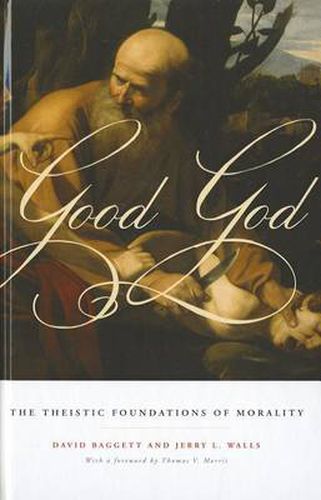Readings Newsletter
Become a Readings Member to make your shopping experience even easier.
Sign in or sign up for free!
You’re not far away from qualifying for FREE standard shipping within Australia
You’ve qualified for FREE standard shipping within Australia
The cart is loading…






This book aims to reinvigorate discussions of moral arguments for God’s existence. To open this debate, Baggett and Walls argue that God’s love and moral goodness are perfect, without defect, necessary, and recognizable. After integrating insights from the literature of both moral apologetics and theistic ethics, they defend theistic ethics against a variety of objections and, in so doing, bolster the case for the moral argument for God’s existence. It is the intention of the authors to see this aspect of natural theology resume its rightful place of prominence, by showing how a worldview predicated on the God of both classical theism and historical Christian orthodoxy has more than adequate resources to answer the Euthyphro Dilemma, speak to the problem of evil, illumine natural law, and highlight the moral significance of the incarnation and resurrection of Christ. Ultimately, the authors argue, there is principled reason to believe that morality itself provides excellent reasons to look for a transcendent source of its authority and reality, and a source that is more than an abstract principle.
$9.00 standard shipping within Australia
FREE standard shipping within Australia for orders over $100.00
Express & International shipping calculated at checkout
This book aims to reinvigorate discussions of moral arguments for God’s existence. To open this debate, Baggett and Walls argue that God’s love and moral goodness are perfect, without defect, necessary, and recognizable. After integrating insights from the literature of both moral apologetics and theistic ethics, they defend theistic ethics against a variety of objections and, in so doing, bolster the case for the moral argument for God’s existence. It is the intention of the authors to see this aspect of natural theology resume its rightful place of prominence, by showing how a worldview predicated on the God of both classical theism and historical Christian orthodoxy has more than adequate resources to answer the Euthyphro Dilemma, speak to the problem of evil, illumine natural law, and highlight the moral significance of the incarnation and resurrection of Christ. Ultimately, the authors argue, there is principled reason to believe that morality itself provides excellent reasons to look for a transcendent source of its authority and reality, and a source that is more than an abstract principle.